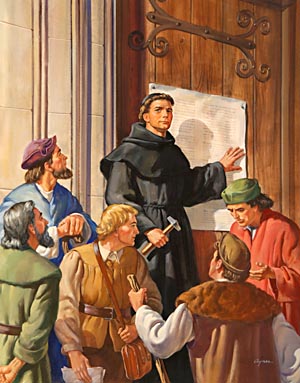
THE BRAVE SPIRIT.
AMERICAN boys are familiar with the lives of those who, from humble birth, have risen to the highest positions in our republic. Let us go to Germany, nine years before America was discovered. Nov. 10, 1483, in a miner's cottage in Eisleben, a little boy is born. His parents are very poor, but they are esteemed for their piety and industry.
In a few months, they removed to Mansfeld. Here we may see them on a winter evening, sitting by their hearth, the wood blazing under the huge iron pot; and hanging above, on the chimney, we see the pewter pans and various cooking utensils. The solid oak table is symbolical of the stability and worth of the parents. The little boy Martin, whom we have seen a baby, soon learned that parents and teachers in those days believed that to "spare the rod" was to "spoil the child."
One day Martin is punished by his mother till she brings blood on account of a trifling fault; and at school he is whipped fifteen times in one forenoon.
Yet the mother begs his father to be less severe with the little boy, and his fond father carries him to school in his arms.
At fourteen, Martin- has learned all that is taught in the school in Mansfeld. With an older boy, he walks fifty miles to the splendid city of Magdeburg. Here he stays a full year. He has no money, and the poor boy goes through the streets singing for his food. His parents see how their brave boy is suffering, and they send him to Eisenach, where he has relatives. His father has so many mouths to feed that he cannot help him any; and the friends he hoped to find in Eisenach fail him. Poor Martin still begs his food, and often falls asleep very hungry. The hard words and blows he has received are making him timid. He sings a Christmas carol at a peasant's door.
The peasant speaks, but the voice frightens him, and he runs, losing the sausage the peasant came
to bring him. One day, with three other boys, he has sung at house after house, and no one has given them food. Fond as he is of study, he feels that he must give up, and go home to a life in the mines. They turn into St. George's Square. Here they have often been kindly received by Ursula Cotta. They stop at her door; and, hearing their voices, she sends for them. She talks with Martin.
She has admired his devotion in church, and been charmed with his sweet singing. She promises him a home in her house; and now he is a light-hearted, happy boy. He has a flute, and learns to play and compose music. His teacher, too, is Trebonius, whose character has been truthfully versified , —
"There was a school-master, Trebonius,
Who followed a principle glorious,
He made it a rule,
When entering his school,
To his urchins to bow,—
And well he knew how,—
`For there may be some great man before us,'
Said respectful old master Trebonius,
Who followed a principle glorious."
Martin next became a student in the University of Erfurt, and now his father is able to pay his expenses in the best college in the land. He studies law; and, before he is twenty-two, he is teacher of philosophy in the University. Looking over the books in the library, he one day finds a Latin Bible. He has never heard that there is more of the Scriptures than the portions of Gospels and Epistles he has heard read in church. He opens to the story of Samuel. He is delighted, and reads till he must go to his lecture. On his way, he prays that some day he may own the book, little dreaming that he will yet give Germany the whole Bible in her own language. For two years he does not see a Bible again. He becomes anxious about his soul. His studies give him no help, and he enters a convent. Here he one day comes upon an old Bible. He studies it, and he sees that Jesus has died for him, and he, Must live by faith in him. His life in the convent and pilgrimage to Rome have disclosed the error and corruption of monks, cardinals, and even of his holiness, the Pope.
This is the early life of Martin Luther, who became the leader of the Reformation that freed Germany from the Pope of Rome. This year it is proposed to restore the doors of the church in Wittenberg, where he nailed his famous theses, as a fitting celebration of the four hundredth anniversary of his birth. How many of my readers when urged to do wrong, will dare to say as bravely as he did, when called to answer for his faith before a great council of his enemies, "Here I take my stand. I can do no otherwise. So help me, God. Amen."
Well-Spring.